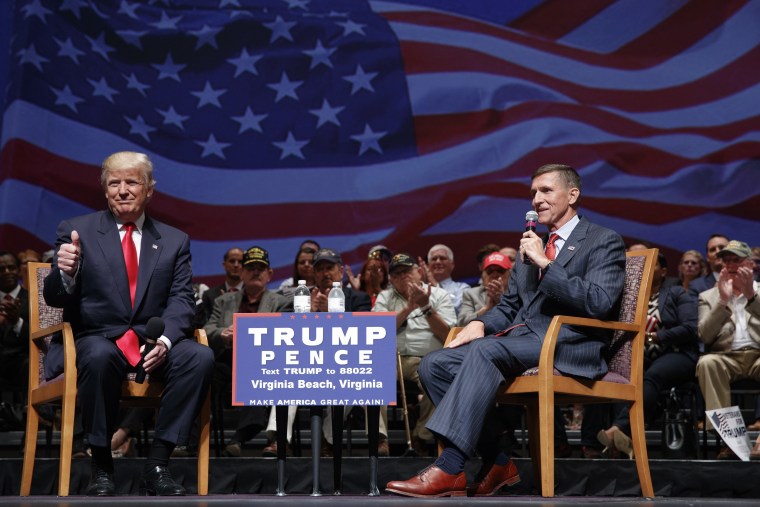As a candidate, Trump’s often unsubstantiated attacks on political opponents, foreign governments, election officials, law enforcement, a federal judge, news outlets and Muslims shattered political norms and sowed division. As president, his decisions will carry the full weight of White House policy, raising concerns about where he gets his information and whether he might act on false or flawed reports.
Trump’s baseless claim that Hillary Clinton won the popular vote with “millions” of illegal voters, for example, appears to have been popularized by Infowars conspiracy theorist Alex Jones, who has also claimed the 9/11 attacks were carried out by the government and that the Sandy Hook shootings were faked.
Every president makes difficult decisions on sensitive issues based on incomplete intelligence and competing advisers, making the ability to discern what news is credible critical to the job. This is especially important when it comes to national security, where presidents have broad latitude to order military action and direct negotiations with foreign leaders.
The iconic example is the 1962 Cuban Missile Crisis, in which President John F. Kennedy pulled the United States from the brink of war by aggressively questioning and ultimately discarding initial calls from military leaders to attack Cuba and navigating mixed messages from Moscow to reach an agreement.
“We hire presidents so they can be calm and level-headed and assess all this information under conditions of great stress and uncertainty in times of crisis,” Elizabeth Saunders, a professor at George Washington University who researches presidential foreign policy decisions, said.
Related: Analysis: Trump's Lengthy History of Conspiracy Theories and Rumors
While Trump lacks experience running government bureaucracy or engaging in foreign policy, the same has been true of many presidents. What Saunders finds “very worrisome” compared to past leaders is his apparent lack of interest in studying up beforehand, his habit of commenting on disasters or attacks before solid info is available, and his reliance on aides who also spread misinformation from dubious sources.
Trump will need to manage hot spots around the world from his first day in office, often with similarly ambiguous info to work off. He has said in the past that he does not trust the intelligence community and rejected a joint assessment by officials accusing Russia of hacking Democratic leaders in order to influence the election.
When there’s an attempted coup or an unexpected military conflict abroad, facts can be difficult to discern and any public statement by the president could have a major impact on how events unfold. During a crisis at home like an Ebola outbreak or a terrorist attack, false rumors can spread on social media and inflame public opinion, and it will be up to Trump to discern what’s actionable and what’s noise.
Related: Donald Trump Has Attended Only Two Intelligence Briefings
Tevi Troy, a former aide to President George W. Bush and author of "Shall We Wake the President?: Two Centuries of Disaster Management from the Oval Office,” noted that presidents were typically careful to confirm information before addressing the public. After news of the 9/11 attacks broke, Bush’s then-press secretary Ari Fleischer held a sign up warning the president “don’t say anything yet” as officials worked to first assess the situation.
“Unfortunately, presidential decisions cannot always wait until we have perfect information before proceeding,” Troy said in an email. “But before speaking, it's important for presidents to make sure that what they are saying is accurate.”
Trump’s choice of national security adviser Michael Flynn has generated concern over his own attraction toward fringe information, suggesting he might reinforce Trump’s tendencies. After having served in a top intelligence post under President Obama, Flynn spent the campaign credulously tweeting fake news stories and directing followers to alt-right accounts.
Part of the problem in assessing Trump is that it’s not always clear what his motive is when he directs his followers to phony stories or unsubstantiated conspiracies.
Mark Fenster, a University of Florida law professor who authored a book on the role of conspiracy theories in American culture, found that populists often used them to rally the faithful with talk of elaborate crimes by elites. Critics have accused Trump of knowingly using false claims of election fraud to set the stage for a crackdown on voting rights, to distract from headlines about his business conflicts, or even just to massage his own ego.
“It’s equally pure speculation to say he believes it as to say he doesn’t and it’s merely a ploy or way to distract,” Fenster said. “I don’t think anyone can know that.”
In Trump’s case, there are hints that some of his more fiery claims are flexible depending on the political moment. After spending the final months of the campaign alleging a vast government conspiracy to protect Hillary Clinton from prosecution that he would expose in office, Trump seemed to lose interest in the matter immediately after winning. He has praised President Obama repeatedly this month after falsely claiming for years he was an illegitimate president who, he hinted at times, might even sympathize with America’s enemies.
At the same time, his selection of Flynn and appointment of former Breitbart president Steve Bannon to a senior adviser position, suggests he values having more conspiracy-minded aides in his inner circle. He has tasked an industry-funded critic of mainstream climate science, which Trump now says he has an “open mind” about after once calling climate change a hoax perpetrated by China, with advising his environmental transition.
Graham Allison, a former defense official and director of Harvard's Belfer Center for Science and International Affairs, said he had trouble judging Trump’s leadership without knowing if his public behavior was for show or an actual blueprint for governing.
“If there’s a direct line from his head to what he said or tweeted, in the complexities of the international arena that would be a big problem,” he said. “On the other hand, this is a person who the press has hugely underrated.”

